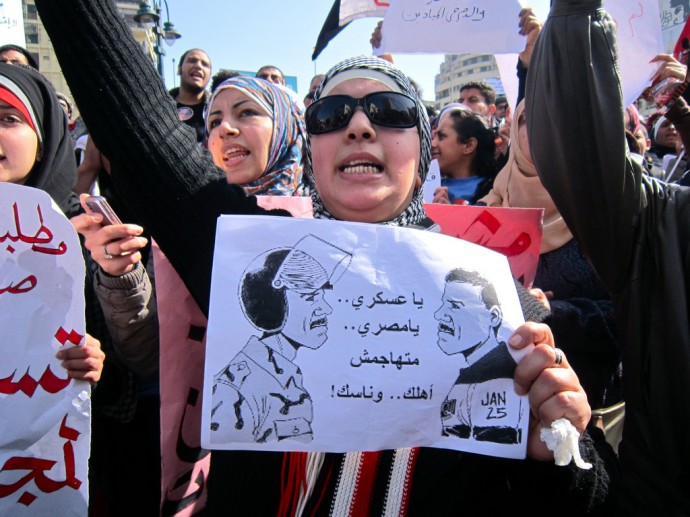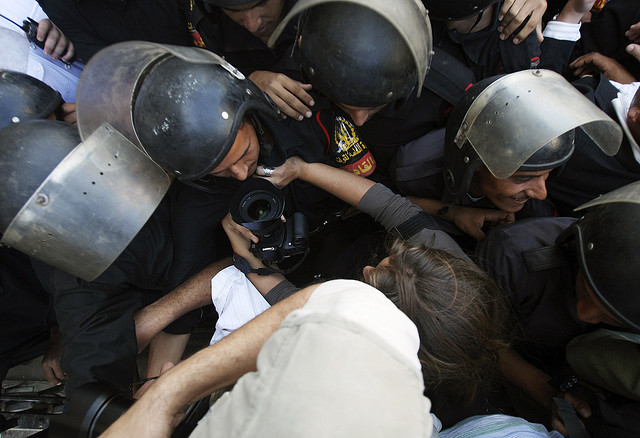
(MintPress) – Tens of thousands of Egyptians gathered in Tahrir Square on Wednesday to commemorate the revolution that ousted former President Hosni Mubarak and to call for continued political reform. It has been one year since protesters in Egypt, inspired by those in Tunisia, put an end to Hosni Mubarak’s long-standing dictatorial rule. One-year later, however, true democracy is yet to be seen.
The Supreme Council of the Armed Forces (SCAF), a group of senior military officers who assumed control of Egypt in February, was once seen favorably by Egyptian protesters in Tahrir. However, after Mubarak stepped down, support for SCAF waned as the military announced an extension of power and began lashing out against civilians.
SCAF lifted the state of emergency and pardoned thousands of prisoners in the wake of the one-year anniversary of the Egyptian revolution, but some Egyptians believe these concessions are just another tactic to maintain power and prevent true democracy from taking shape.
.
Military Crackdown
SCAF’s human rights record has gotten progressively worse since gaining power after Mubarak’s fall in February 2011. Last fall, military forces were accused of killing dozens of Coptic Christians, subjecting women to virginity tests, and brutally attacking peaceful protesters in Tahrir.
On November 18th, Egyptians took to Tahrir after Deputy Prime Minister Ali El Selmi announced his plans for the Selmi Document, a set of constitutional principles that would extend the powers of SCAF.
According to NPR, “These [powers] include the authority to appoint eighty of 100 members of the constituent assembly charged with drafting it, the right to object to certain provisions and the power to appoint an entirely new assembly if a constitution is not drawn up within six months.” It would also give SCAF a secret budget and free jurisdiction on the army’s internal affairs.
Over the next five days, over forty-two people were killed and at least 3,000 wounded in clashes with military and police forces.
.
Concessions as State Control
This week Field Marshal Hussein Tantawi pardoned over 2,000 prisoners in commemoration of the one-year anniversary of the Egyptian revolution. Among those released was 26-year-old blogger, Maikel Nabil Sanad.
Sanad was arrested in March for his blog post titled, “The army and the people were never one hand.” Sanad, labeled a prisoner of conscience by Amnesty International, staged a hunger strike from prison and resisted the authority’s efforts to place him in the psychiatric ward.
On Tuesday, Tantawi announced that the state of emergency, in place since 1967, would be lifted on the one-year anniversary as well. However, Tantawi added that the law would still be applied in cases of “thuggery.”
According to BBC news,
the military has most typically used the term “thugs” in reference to civilians demanding an immediate return to civilian law. Therefore, SCAF’s decision to lift the state of emergency still leaves thousands of protesters vulnerable to military abuse under the “thuggery” clause.
SCAF’s decisions to lift the state of emergency and pardon prisoners is a paltry peace offering on the first anniversary of the Egyptian Revolution at a time when tens of thousands of Egyptians have returned to Tahrir, many chanting “down with the military.”
By offering concessions to Egyptians, the military hopes to abate renewed protests in Tahrir. However, SCAF’s efforts to stifle resistance and maintain control is not working as well as planned.
.
Renewed Protests One Year Later
Egyptians voiced their frustration with SCAF on Wednesday when protesters once again took to Tahrir square. Some Egyptians came to the square to celebrate the success of recent elections and mourn the martyrs of the revolution while others came to demand that the military halt human rights abuses and relinquish power to the people.
This week’s protests are not nearly as unified as those one-year-ago. Yet, renewed energy on the first anniversary of the January 25th uprising has sparked a reawakening in Egyptians who claim they will not be satisfied until the old Mubarak system is completely abolished.
Just last week, leading reform advocate and Nobel Peace laureate, Mohamad El Baradei, withdrew his presidential bid. According to NPR, Baradei announced his withdrawal in protest of the military council’s failures, saying, “My conscience does not permit me to run for the presidency or any other official position unless it is within a real democracy.”
Several groups vowed to stay in the square through at least Friday, when more protests are planned. According to BBC News, demonstrator Khaled Abdallah told the Reuters news agency: “The army and police murdered us and cut off the revolution’s voice; but I am telling you now, the revolution’s voice will not be silenced.”
Source: MintPress


